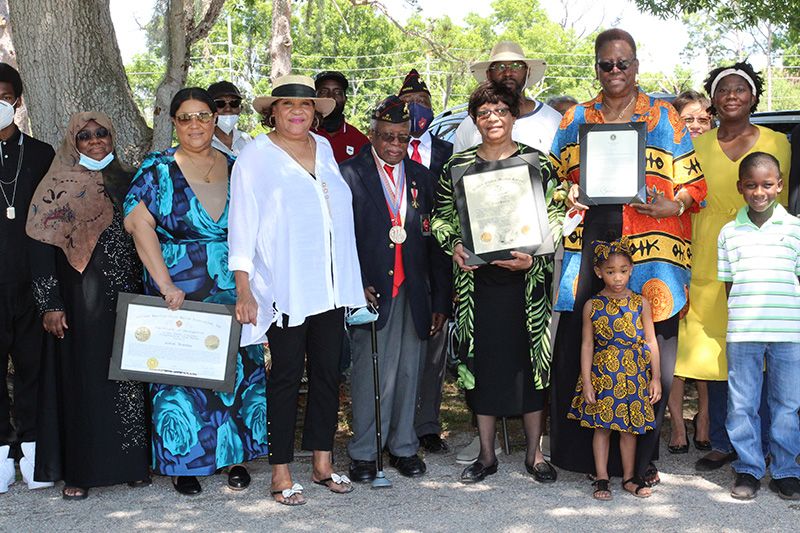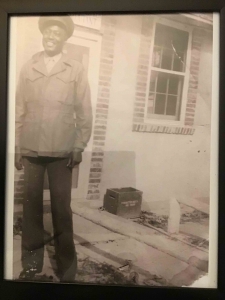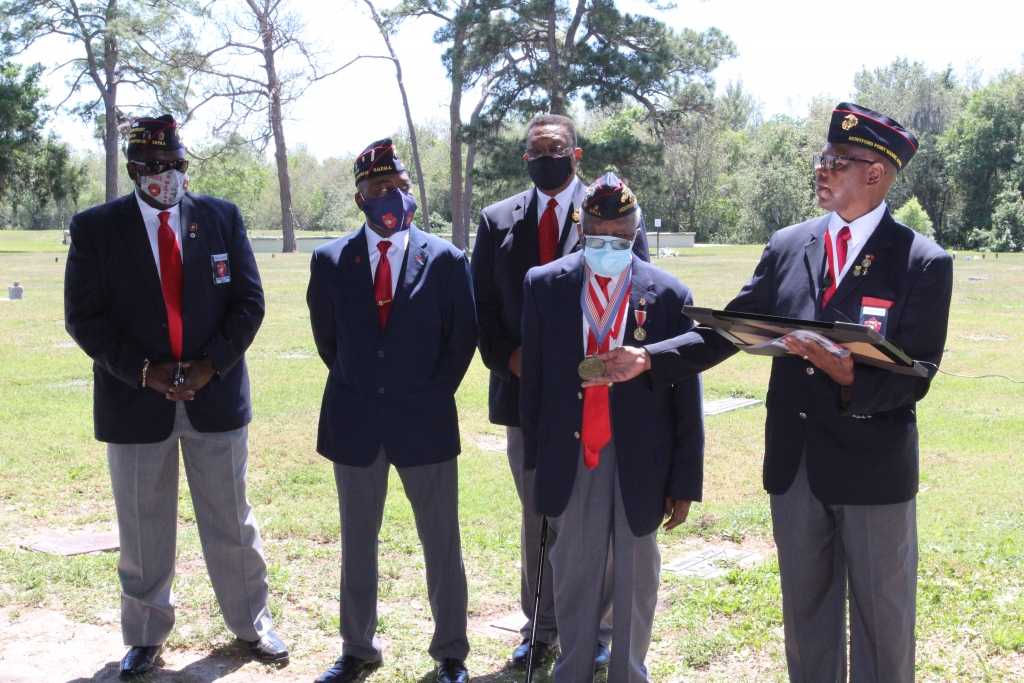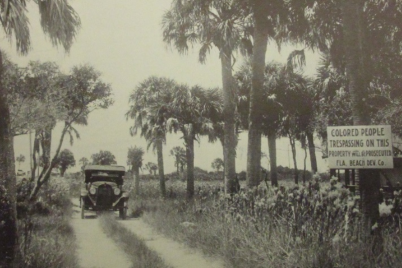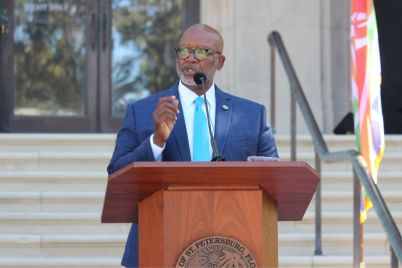Julius Bradley’s family was presented with his Congressional Gold Medal and certificates of recognition for his service to the country as a Montford Point Marine during War War II. He died in 1991. The Bradley family is seen here with 95-year-old Montford Point Marine George McIvory.
RAVEN JOY SHONEL, Staff Writer
ST. PETERSBURG — Julius Bradley was a Black U.S. Marine in World War II, which made him a Montford Point Marine. He put his life on the line for a country that considered him a second-class citizen. He died in 1991 without any recognition for his service.
On March 27, Bradley’s family was presented his Congressional Gold Medal along with certificates of recognition from President Barack Obama, General David H. Berger, the current Commandant of the Marine Corps, and the Montford Point Marine Association, Chapter #29, who worked tirelessly to make sure his name was not lost to time.
Ret. Cpl. Eddie Pringle, USMC, welcomed the crowd, stating that in Bradley’s era, there were three boot camp entry points into the marines: Paris Island, San Diego, and Montford Point in North Carolina for Black enlistees.
“And it was the most difficult boot camp of all because they had a little racism thrown in there,” said Pringle.
Members of Chapter #29 came from Jacksonville to honor Bradley alongside his family and friends at his gravesite at Royal Palm Cemetery North on Gandy Boulevard.
“These men and all Black men and all Black history is American history that was originated and came from within the borders of this country,” stated Master Gunnery Sgt. George Gillis, Retired. “Don’t let anyone tell you that our history is not American history. We belong to American just like they belong to America.”
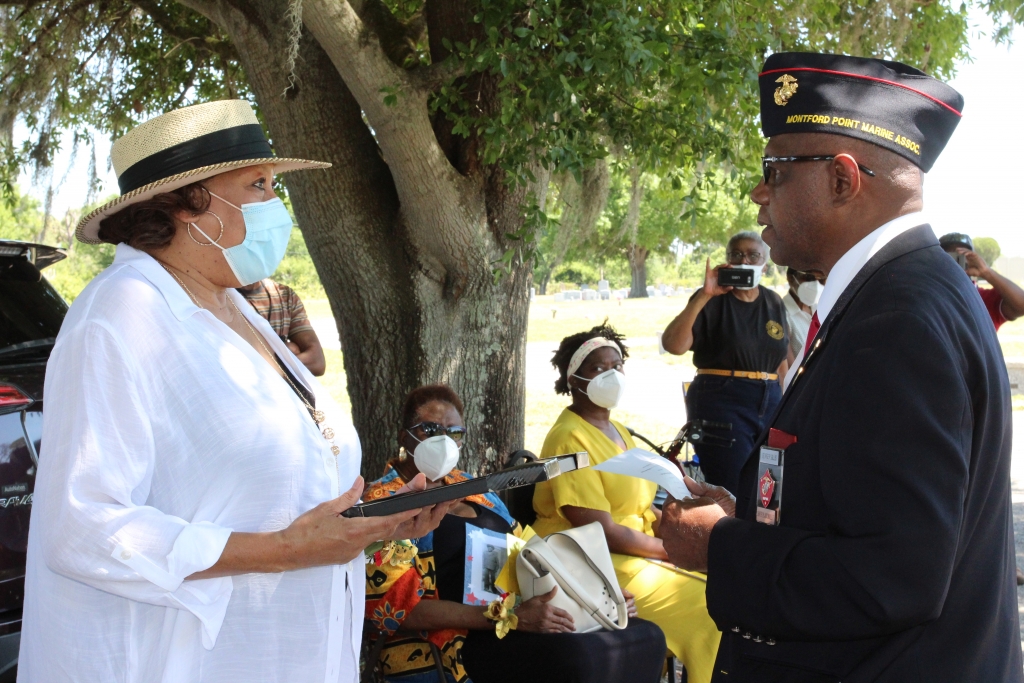
Master Gunnery Sgt. George Gillis, Retired, presents daughter Mary Bradley with Julius Bradley’s recognition from President Barack Obama.
In 1941, the United States was organizing white troops to enter World War II. President Franklin D. Roosevelt had no interest in ending the hiring discrimination practices based on race in the defense industry, but civil rights leaders fought for change.
With a planned march on Washington to pressure the president into opening up the defense industry to Black people, Roosevelt conceded a week before the march. He signed Executive Order 8802 on June 25, 1941, prohibiting racial discrimination in the armed forces and in government.
The Executive Order opened the door for Black recruitment into the armed forces, but unfortunately, Jim Crow and all its ills also enlisted. Throughout the military branches, Black servicemen and women endured segregation, mistreatment, demoralization, appalling conditions, and the U.S. Marines Corps was no different.
The first Black men recruited into the Marine Corps began on June 1, 1942. Between 1942 and 1949, nearly 20,000 African-American men completed recruit training and became known as the Montford Point Marines.
All but left out of American’s “Greatest Generation” narrative, President Barack Obama signed into law the legislation to award the Congressional Gold Medal to the Montford Point Marines on Nov. 23, 2011. It took almost seven decades and the first Black president of the county to recognize the Montford Point Marines’ contributions to the Marine Corps and the United States.
Bradley had passed away when the Congressional Gold Medal was presented collectively to the Montford Point Marines on June 7, 2012, at a ceremony held in the U.S. Capitol Rotunda. Many of the Montford Pointers were present for the ceremony.
Bradley was born on Dec. 1, 1912, in the Pass-a-Grille Beach area. His father, William Bradley, owned two houses and a rooming house he rented to Black workers from St. Petersburg to work in the hotels and kitchens. He also owned a concession that sold goodies and rented bathing suits to Black beachgoers.
In the early 1920s, Pass-a-Grille was becoming a beach town, and African Americans were no longer welcomed.
“We had to leave, all Indians and all Blacks. It came down from city hall or somewhere. The mayor was named (J.J.) Duffy. We were the only ones left. What was happening was the city was expanding, and they were building on the bay side and Gulf side, and the city wasn’t going to sandwich in one Black family,” Bradley said in a 1990 article in the St. Petersburg Times.
Once again, eminent domain claimed the wealth of another Black family. William Bradley was the last African American to leave the area, moving his family to St. Pete. The family moved to Sixth Avenue and 17th Street South in the Gas Plant area, which again was taken by eminent domain to build Tropicana Field in the 1980s.
The family was apprehensive about leaving Pass-a-Grille because of the racial terror lynchings that took place in St. Pete.
“One thing about this town … They lynched Negroes in St. Petersburg, but nothing like that happened in Pass-a-Grille,” said Bradley to the St. Petersburg Times.
After graduating from Gibbs High School, he attended Morris Brown College, majoring in biology and chemistry. Bradley decided to take a job at Gibbs as a math teacher. He then enlisted into the marines on Oct. 14, 1943, leaving his first wife (Alene Ivey Bradley) back in St. Pete. From that union, he produced Jacquilin Bradley Wallace and Rudolph Bradley.
“He just wanted to serve,” said his first daughter Bradley Wallace, who could not attend the ceremony.
Bradley left the military in May of 1946 as a sergeant and went back to teaching at Gibbs. He married his second wife (Helen Bradley), and from that union came Cynthia McTier, Rosalyn Hunter, and Mary Bradley. Once their marriage dissolved, he moved to Philadelphia, eventually moving back to St. Pete before his death on Dec. 17, 1991.
“We honor these men … because they served with dignity. They were pathfinders for the future of Black men and women in the United States,” said Gillis.
At the ceremony, 95-year-old Montford Point Marine George McIvory made the trek from Jacksonville to meet Bradley’s family and tell his story.
He entered the marines in January of 1944, right out of high school.
“Once I got in there and learned how tough it was and what the situation was, I resigned that … I would never wash out. If I got out of the Marine Corps, it would be on my terms not that I was made to get out. Everything was segregated … they really wanted to make sure that you didn’t qualify,” said McIvory.
The Bradley family would like to thank former Marine Carlton Hooker for alerting them to the fact their patriarch was due his Congressional Gold Medal. After attending a funeral for Bradley’s sister, Hooker noticed that his grave marker had “U.S. Marine Corps World War II” on it. He knew right then that Bradley was a Montford Point Marine.
Hooker told Pringle, and the two called the National Montford Point Marine Association, who in turn put them in contact with Chapter #29.
“That’s what marines do — the brotherhood. They set the tone for us. I know, and every Black Marine knows what they went through was twice as hard as what we went through,” said Hooker, who saw action in Vietnam.
If you know of a Montford Point Marine due his recognition, please contact George Gillis, president of the Montford Point Marine Association Inc. Chapter #29 at (904) 472-8536.

